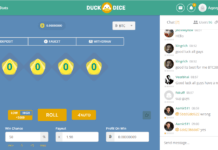Online gambling has came a long way since the start of the internet. It currently takes around 10% of total legal turnover in the world gambling business. But trust on a online casino is a major issue. The backend of games remains black box to us. The DAO.Casino project solves this problem by enabling a sustainable model which benefits all parties involved in the online gambling business process. It also provides player with access to diverse range of games from independent game developers having a higher level of security than in traditional online casino.
Goals
The DAO protocol has following goals
- Reduce operational costs of online gambling therefore provide higher payouts
- Reduce a risk of fraud
- Remove the need and responsibility from online casino operators to maintain player’s account balances
- Enable game developers to monetise their work while maintaining their IP
- Enable game developers to access bankroll for their game without extra responsibility for managing it
- Enable an open ecosystem of provably fair interoperable online casinos

System Participants
Because it is a trust-less system, there are many roles that are needed for the system to develop and to function. They are listed below.
- Game Developer
- Platform Operators
- Referrers
- Random Number Provider
- Bankroll Backers
- Players
- Autonomous Agents (Contracts without superusers)
Token System
DAO protocol is based on Ethereum token BET which is a ERC20 token. It is used as ingame currency for all the game contracts integrated with the protocol and to power DAO.Casino reward system. Overtime BET accounts history can be used as a reputation system and for ranking the games and the players. For example most popular games would have more transaction history.
Keys to the BET can be stored in platform wallets by players and in any Ethereum client or by more advanced Ethereum users, or a paper wallet. You should not store large amount of BET in a web wallet.
Random Numbers
Random numbers are backbone of any online casino. In real world randomness is obtained because each human is different from other an does not perform the same task with same result. But computers are not random.
Obtaining randomness (RNG), or to be more precise pseudo-randomness (PRNG) in the context of gambling games is a complex issue. There are different approaches for obtaining such values. Mathematical proofs and high quality of the selected method is important. In simple words, pseudo-random number that determines an outcome of the game should be equally unpredictable for all parties involved. Only in this case we can say that the players and the casino are protected from fraud, and the scheme is tested and reliable.
The most common method of random number generation is called the linear congruential method. Alternatively, there is the additive congruential method. These methods generate a sequence of numbers satisfying the condition of randomness. The basis for the use of these and other methods of random number generation is the software, infinitely generating numbers, regardless of whether the participant is currently in the game or not. This eliminates the possibility of the player to independently determining the generation method used at this moment, and “guessing” the drawn numbers.
Conclusion
Smart-contract powered gambling games are gaining traction, in future this protocol will be used heavily and I look forward to it. You will updated to latest news of DAO here.




























